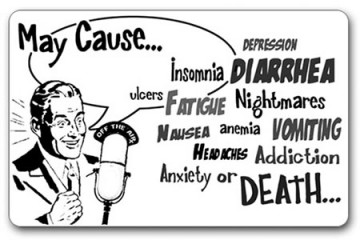Know a drug’s side effects before taking it!
Open the pack of any standard drug, and you’re likely to find a leaflet with tiny prints that actually contains all you need to know about how the drug works, the number of times you should use it per day and for how long; as well as other instructions telling you if the drug could give you side effects.
But more important is the section containing what is technically called “contra-indications,” listing possible side effects or reactions to the drug. These may range from vision loss to developing double vision, suffering miscarriage, impotence, hallucination, headaches, difficulty walking, generalised skin rash, heart attack, stroke, total or partial paralysis, gastrointestinal issues such as nausea, constipation and diarrhea; muscle aches, difficulty in breathing, abnormal heart rhythm, chest pain, weakness, and, in extreme cases, sudden death!
Drugs are prescribed in order to help a sick person get well. But then, just as the drugs target your symptoms, chances are that they also act beyond their brief by wreaking havocs on your body if you go beyond the recommended dosage, or if you have certain health issues that your doctor doesn’t know about.
General Practitioner, Dr. Steve Ipaye, says in general, doctors don’t just prescribe drugs but beyond taking a patient’s medical history into consideration, they also instruct a patient to start taking his drug at lower dosages and if he tolerates it well enough, it could be increased, depending on the condition and other considerations.
Ipaye warns that medicines can cause unwanted side effects, whether they are prescribed by the doctor or bought over-the-counter.
“Any medicine, herbal preparations, vitamins, and natural or herbal medicines can have side-effects. Risks could be less serious things, such as an upset stomach, or more serious things, such as liver damage.
“Most side effects vary from person to person, depending on the dosage, the patient’s disease, age, weight, sex, and overall health. That is why it is necessary for you to tell your doctor about all the medicines you take, including prescription, over-the-counter and complementary medicines. That way, he will know how to deal with your case and advise appropriately,” he counsels.
So, what kind of drugs can pose havoc? Ipaye says any drug can. “Even eye drops can lead to certain unwanted side effects. But the standard practice is that once you notice adverse reactions to any drug, the next thing is to see your doctor immediately. Don’t just change it, because you may end up with a worse medication,” the physician enthused.
Aphrodisiacs
One of the most popular drugs that people love to use is Viagra, a drug that was introduced in 1998 primarily to treat coronary heart disease. After many clinical trials, however, it turned out that it could also be used in the treatment of erectile dysfunction. Consequently, its popularity has soared among men.
Ipaye says Viagra is now in the same family as other drugs that are known as the phosphodiesterase 5 inhibitors, which are meant to be taken only by men who have erectile dysfunction, though they are increasingly being misused and even abused.
“These days, people use Viagra and other drugs in that class not just to get an erection, but also to prolong erection. That is recreational use, and it is not appropriate,” the physician says.
He warns that men who use Viagra for frivolous reasons like this increase their risks for cardiovascular issues, especially if they also take certain prescriptive medications for chest pain and also if they have active coronary heart disease.
Ipaye warns that men who have congestive heart failure, low blood pressure (hypotension), or those who take cocktails of medications for high blood pressure are only worsening their health problems, which may send them to early graves if they persist in Viagra abuse.
He says such people may suffer drug dependence; while they also risk developing erectile dysfunction if they no longer use the drugs.
“This could mean having to use more aggressive treatments like injections or implants to treat erectile dysfunction in the future,” the GP warns.
Physicians say in rare cases, Viagra abuse can also cause a type of colour blindness that sometimes makes it difficult to distinguish between blue and green; or, in worst case scenario, it can cause brief or long-term total vision loss when there’s an interruption of blood flow to the optic nerve.
Ipaye counsels, “If you have not been properly evaluated by your doctor and properly prescribed an erectile dysfunction drug, you should not be taking one. Again, an erection that lasts for hours is not a good thing. It is painful and dangerous.”
Antibiotics
Antibiotics are a group of medicines that are used to treat infections caused by germs. Ipaye says that an antibiotic such as Amoxicillin and other drugs in its class are capable of giving you diarrhoea, even though they’re meant to treat certain infections that require antibiotics.
“Amoxicillin may also give you thrush, a type of yeast infection that affects the mouth; and, among women, it may lead to dry, itchy vagina,” the physician says.
He adds, “The most common side effects of antibiotics affect the digestive system, and it occurs in about one in 10 people. Such side effects include feeling sick, bloating and indigestion, abdominal pain and loss of appetite.
“Also, an antibiotic such as Tetracyclines can make your skin sensitive to sunlight and artificial sources of light such as sun lamps and sunbeds.”
Sleeping pills
Many people take sleep-inducing drugs whenever they can’t sleep, while doctors also prescribe them in some cases, but many people can be dependent on them.
Ipaye warns that taking even a little more than one sleeping pill such as Valium in a month is capable of increasing your risk of death by 3.5-fold!
The bottom line: Don’t mess around with medications!








